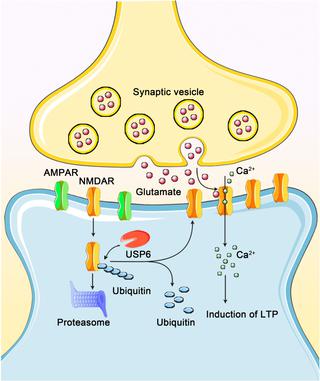当前位置:
X-MOL 学术
›
PLOS Biol.
›
论文详情
Our official English website, www.x-mol.net, welcomes your
feedback! (Note: you will need to create a separate account there.)
The deubiquitinase USP6 affects memory and synaptic plasticity through modulating NMDA receptor stability.
PLOS Biology ( IF 7.8 ) Pub Date : 2019-12-16 , DOI: 10.1371/journal.pbio.3000525 Fanwei Zeng 1 , Xuehai Ma 1, 2 , Lin Zhu 1 , Qiang Xu 1 , Yuzhe Zeng 1 , Yue Gao 1 , Guilin Li 1 , Tiantian Guo 1 , Haibin Zhang 1 , Xiaoyan Tang 3 , Ziqiang Wang 4 , Zesen Ye 1, 5 , Liangkai Zheng 6 , Hongfeng Zhang 1 , Qiuyang Zheng 1 , Kunping Li 1 , Jinfang Lu 1 , Xueting Qi 1 , Hong Luo 1 , Xian Zhang 1 , Zhanxiang Wang 1, 5 , Yulin Zhou 6 , Yi Yao 7 , Rongqin Ke 4 , Ying Zhou 8 , Yan Liu 3 , Hao Sun 1 , Timothy Huang 9 , Zhicheng Shao 1 , Huaxi Xu 9 , Xin Wang 1
PLOS Biology ( IF 7.8 ) Pub Date : 2019-12-16 , DOI: 10.1371/journal.pbio.3000525 Fanwei Zeng 1 , Xuehai Ma 1, 2 , Lin Zhu 1 , Qiang Xu 1 , Yuzhe Zeng 1 , Yue Gao 1 , Guilin Li 1 , Tiantian Guo 1 , Haibin Zhang 1 , Xiaoyan Tang 3 , Ziqiang Wang 4 , Zesen Ye 1, 5 , Liangkai Zheng 6 , Hongfeng Zhang 1 , Qiuyang Zheng 1 , Kunping Li 1 , Jinfang Lu 1 , Xueting Qi 1 , Hong Luo 1 , Xian Zhang 1 , Zhanxiang Wang 1, 5 , Yulin Zhou 6 , Yi Yao 7 , Rongqin Ke 4 , Ying Zhou 8 , Yan Liu 3 , Hao Sun 1 , Timothy Huang 9 , Zhicheng Shao 1 , Huaxi Xu 9 , Xin Wang 1
Affiliation

|
Ubiquitin-specific protease (USP) 6 is a hominoid deubiquitinating enzyme previously implicated in intellectual disability and autism spectrum disorder. Although these findings link USP6 to higher brain function, potential roles for USP6 in cognition have not been investigated. Here, we report that USP6 is highly expressed in induced human neurons and that neuron-specific expression of USP6 enhances learning and memory in a transgenic mouse model. Similarly, USP6 expression regulates N-methyl-D-aspartate-type glutamate receptor (NMDAR)-dependent long-term potentiation and long-term depression in USP6 transgenic mouse hippocampi. Proteomic characterization of transgenic USP6 mouse cortex reveals attenuated NMDAR ubiquitination, with concomitant elevation in NMDAR expression, stability, and cell surface distribution with USP6 overexpression. USP6 positively modulates GluN1 expression in transfected cells, and USP6 down-regulation impedes focal GluN1 distribution at postsynaptic densities and impairs synaptic function in neurons derived from human embryonic stem cells. Together, these results indicate that USP6 enhances NMDAR stability to promote synaptic function and cognition.
中文翻译:

去泛素酶USP6通过调节NMDA受体稳定性影响记忆和突触可塑性。
泛素特异性蛋白酶(USP)6是一种类人猿去泛素化酶,以前与智力障碍和自闭症谱系障碍有关。尽管这些发现将USP6与更高的脑功能联系起来,但尚未研究过USP6在认知中的潜在作用。在这里,我们报告说USP6在诱导的人类神经元中高度表达,并且USP6的神经元特异性表达增强了转基因小鼠模型中的学习和记忆。同样,USP6表达调节USP6转基因小鼠海马体中N-甲基-D-天冬氨酸型谷氨酸受体(NMDAR)依赖性的长期增强和长期抑制。蛋白转基因USP6小鼠皮层的蛋白质组学表征显示,NMDAR泛素化减弱,伴随着USP6过表达,NMDAR表达,稳定性和细胞表面分布随之升高。USP6积极调节转染细胞中GluN1的表达,而USP6下调会阻止突触后密度下的局灶性GluN1分布,并损害源自人类胚胎干细胞的神经元的突触功能。在一起,这些结果表明USP6增强NMDAR稳定性,以促进突触功能和认知。
更新日期:2019-12-17
中文翻译:

去泛素酶USP6通过调节NMDA受体稳定性影响记忆和突触可塑性。
泛素特异性蛋白酶(USP)6是一种类人猿去泛素化酶,以前与智力障碍和自闭症谱系障碍有关。尽管这些发现将USP6与更高的脑功能联系起来,但尚未研究过USP6在认知中的潜在作用。在这里,我们报告说USP6在诱导的人类神经元中高度表达,并且USP6的神经元特异性表达增强了转基因小鼠模型中的学习和记忆。同样,USP6表达调节USP6转基因小鼠海马体中N-甲基-D-天冬氨酸型谷氨酸受体(NMDAR)依赖性的长期增强和长期抑制。蛋白转基因USP6小鼠皮层的蛋白质组学表征显示,NMDAR泛素化减弱,伴随着USP6过表达,NMDAR表达,稳定性和细胞表面分布随之升高。USP6积极调节转染细胞中GluN1的表达,而USP6下调会阻止突触后密度下的局灶性GluN1分布,并损害源自人类胚胎干细胞的神经元的突触功能。在一起,这些结果表明USP6增强NMDAR稳定性,以促进突触功能和认知。











































 京公网安备 11010802027423号
京公网安备 11010802027423号